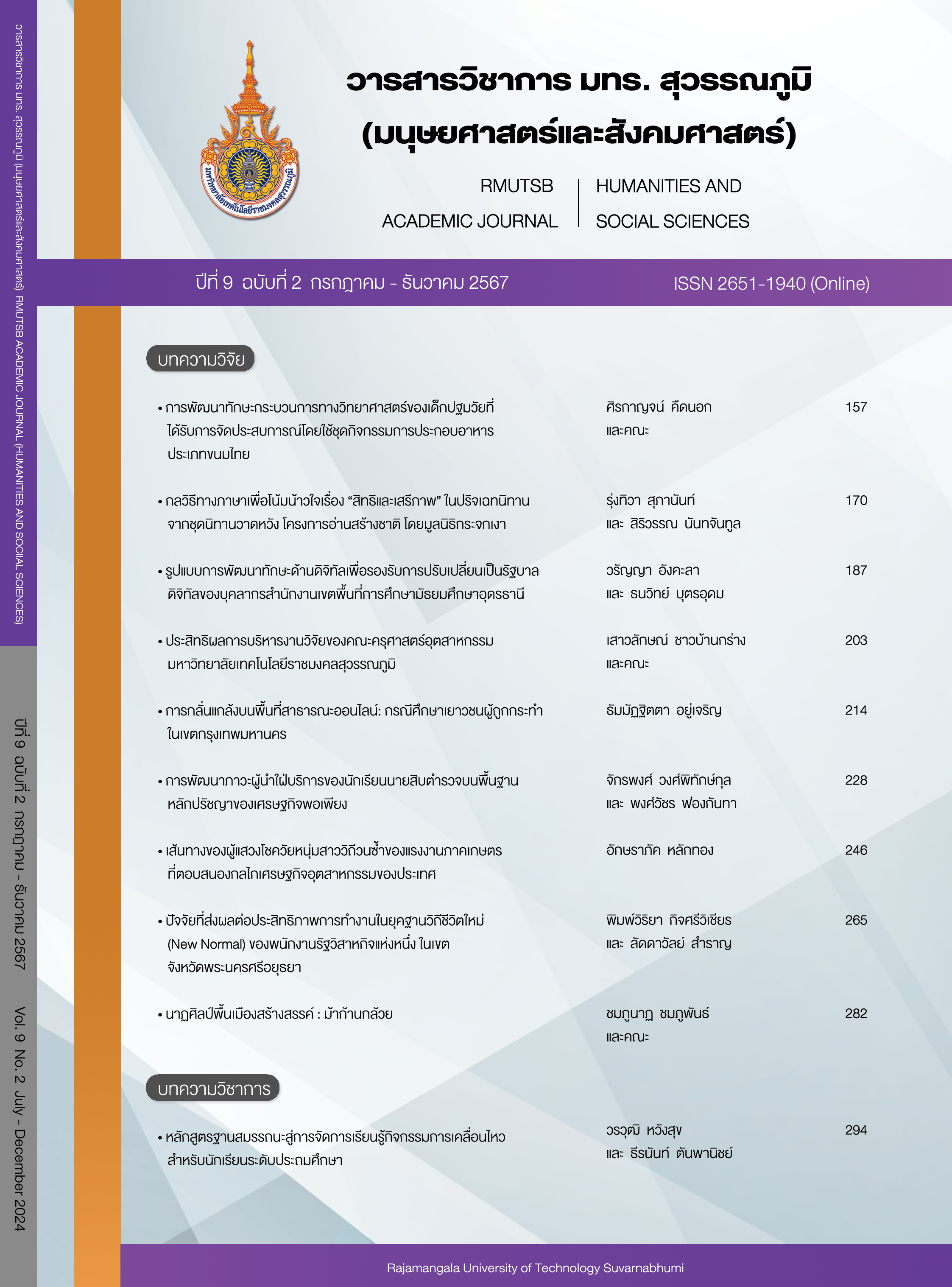The digital skills development model to support the transformation of the digital government of personnel at the Secondary Educational Service Area Office Udon Thani
Main Article Content
Abstract
The purposes of this research were to study the current state, factors influencing the development of digital skills, and the digital skills development model to support the transformation of the digital government personnel at the Secondary Educational Service Area Office Udon Thani. This research is a mixed-method research between quantitative and qualitative research. 1) Quantitative research, the population consists of 62 personnel working in the Secondary Educational Service Area Office Udon Thani. The research instrument used was a questionnaire. The statistics used were percentage, mean, standard deviation, Pearson's Product Moment Correlation Analysis, and stepwise multiple regression analysis. 2) Qualitative research, the 4 informants were the Director of the Secondary Educational Service Area Office Udon Thani, the Deputy Director of the Secondary Educational Service Area Office Udon Thani, responsible for the Human Resources Management Group, the Director of the Human Resources Management Group, and the Director of the Distance Learning Information and Communication Technology Group. Data was collected using a semi-structured interview. The research results found that the current conditions supported the transformation to digital government of personnel in the Secondary Educational Service Area Office Udon Thani with at a high level overall. Factors influencing digital skills to support the transformation to digital government of the Secondary Educational Service Area Office Udon Thani include budget, technology, and executives (with statistically significant at the .01 level) and development (at the .05 level). Models for developing digital skills to support the digital government transformation of the Secondary Educational Service Area Office Udon Thani personnel consist of four components: 1) Target Group Identification, 2) Content Development, 3) Activity Planning, and 4) Monitoring and Evaluation.
Article Details

This work is licensed under a Creative Commons Attribution-NonCommercial-NoDerivatives 4.0 International License.
References
Bunsanongchokying, P. (2020). Digital skills development to support the change to digital organization of Personnel of Secretarial Division, Medical Service Department, Bangkok Metropolitan Administration (Master’s thesis). Ramkhamhaeng University, Bangkok. (in Thai)
Chayamarit, S. (2021). Human resource development to accommodate the public and private sector organizations in the digital age. Journal of Multidisciplinary in Humanities and Social Sciences, 4(1), 38-50. (in Thai)
Cronbach, L. J. (1951). Coefficient alpha and the internal structure of tests. Psychometrika, 16(3), 297-334.
Digital Government Development Agency (Public Organization). (2019). Performance tracking report and suggestions according to the development plan digital government. Bangkok: Digital Government Development Agency (Public Organization) (DGA). (in Thai)
Jehteemae, R. (2022). The efficiency improvement digital skills for government official at Saphansung District (Master’s thesis). Ramkhamhaeng University, Bangkok. (in Thai)
Kodchasila, P. (2022). Guidelines for developing digital skills of civil servants: case study a government agency (Master’s thesis). Thammasat University, Bangkok. (in Thai)
Kunnarat, I., & Butrudom, T. (2021). The factors affecting government 4.0 of Udonthani Municipality. Journal of Humanities and Social Sciences Review Lampang Rajabhat University, 9(1), 37-48. (in Thai)
Office of the Civil Service Commission. (2019). Digital skills are required for civil servants and government personnel to transform into a digital government. Retrieved 1 August 2023, from https://www.ocsc.go.th/sites/default/files/00_khuumuuethaksadaandicchithalkhngkhaaraachkaaraelabukhlaakrphaakhratht.pdf (in Thai)
Office of the National Research Council of Thailand. (2016). Textbook set for training courses for researchers. Bangkok: Office of the National Research Council of Thailand. (in Thai)
Prasith-rathsint, S. (2003). Social science research methodology. Bangkok: Samlada. (in Thai)
Ruangpraphan, C. (2013). Basic statistics. Khon Kaen: Department of Statistics, Faculty of Science Khon Kaen University. (in Thai)
Sittisak, A. (2020). Digital literacy competency for personnel of the Faculty of Humanities and Social Sciences, Khon Kaen University. Journal of Information Science, 38(4), 61-81. (in Thai)
The Secondary Educational Service Area Office Udon Thani. (2023). Action plan for fiscal year 2023. Retrieved 1 August 2023, from https://drive.google.com/file/d/1SgTlZl49KAqjQvjJwdtn5tbtzXyRzB8x/view (in Thai)


